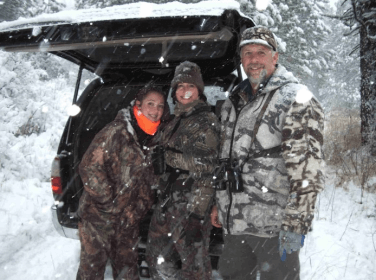- Home
- About
- Blog
- For Parents
-
Corners
- Allison’s Corner
- Amber’s Category
- Andrea’s Corner
- Ashley’s Corner
- Brandi Jo’s Corner
- Brittany’s Corner
- Brooke’s Corner
- Catrina’s Corner
- Conservation
- Desiree’s Corner
- Emily’s Corner
- Erica’s Corner
- Erin’s Corner
- Heather’s Corner
- Ivory’s Corner
- Jeana’s Corner
- Katie’s Corner
- Kelly’s Corner
- Kelsey’s Corner
- Kendra’s Corner
- Liberty’s Corner
- Lisa’s Corner
- Meagan’s Corner
- Melissa’s Corner
- Mimi’s Corner
- Morgan’s Corner
- Nicole’s Corner
- Sarah’s Corner
- Savannah’s Corner
- Shannon’s Blog
- Sharon’s Corner
- Sherri’s Corner
- Tara’s Corner
- Contact
- Guest Post

Getting Started: Mentors (Part 2)
In my last “Getting Started” blog, I discussed where to look to find mentors to help get you started in your hunting career. This blog will address the qualities you should look for in a good mentor.
–
In many areas of my life such as my career, my role as a parent, and of course as an avid huntress, I have at various times been both the mentor and the mentee. Through these experiences I have learned, sometimes the hard way, what qualities a good mentor possesses and what makes for a positive learning experience.
–
A good mentor will motivate, encourage, direct, and teach their apprentices. They should be willing to take the time to explain things in a way you – the mentee – can understand. If one way of explaining something isn’t quite getting through, they should try to find another approach. Not everyone learns the same way or at the same pace. Instead of becoming frustrated, patience is the key.
–
For example: When my husband first taught me how to shoot a bow, he started with the basics, taking it one-step-at-a-time and making sure I had mastered the lesson before adding another step. Gradually, he built one lesson upon another, always giving me encouragement and praise, until I was able to go through the entire act of nocking an arrow, drawing, anchoring, sighting, and finally releasing it towards the target. It was fun, and I learned my lessons well too; last year three whitetail bucks fell to my arrows!
–
A bad mentor, on the other hand…. I still cringe when remember when I first tried to learn how to ski. I actually had two “mentors” – and two different learning experiences – both of which were equally negative. In each case, the mentors had been skiing for many years and were skilled and knowledgeable. However, their idea of teaching me was to spout off a long list of steps that I needed to do to make a run down the mountain. When I couldn’t put the steps together with the skill they thought I should have (usually resulting in me crashing into a snow bank), they both became visibly frustrated, which made me even more anxious. I wanted to do things right, but the more I stressed about trying to be perfect, the more anxious I got and the more frustrated they got. It wasn’t very long before they lost patience with me — and before I decided I didn’t really want to learn how to ski anymore! I wasn’t having fun because I wasn’t learning in an environment that felt safe. More than 20 years later, I still have no desire to learn to ski, all because of those two negative experiences.
–
A good mentor knows her subject, but also remembers that everyone has to start somewhere and that once upon a time even they themselves were beginners. Mentors should encourage the effort, whether or not it is successful. Making mistakes is a natural part of the learning process. It should feel safe to make mistakes. Constructive criticism is important, with “constructive” being the operative word. In my skiing experience, my mentors made me feel like an idiot…it was not a safe learning environment.
–
As a mentee, don’t be afraid to ask questions. If you see your mentor do something that you don’t understand, ask. A good mentor will be more than happy to answer your questions.
–
Last, but most important, a good mentor is respectful. Respect is an essential element of any good hunter and comes into play in so many ways. The mentor should have respect for the student, the environment, the weapons, wildlife, the sport of hunting, and the rules and regulations. These are all parts of being not only a good mentor, but an ethical hunter. These are the essential qualities that a mentor passes on from one generation of hunters to the next and the things that are necessary to keep the sport alive.
Aug 09, 2013 | Category: Blog | Comments: none

Leave a Reply